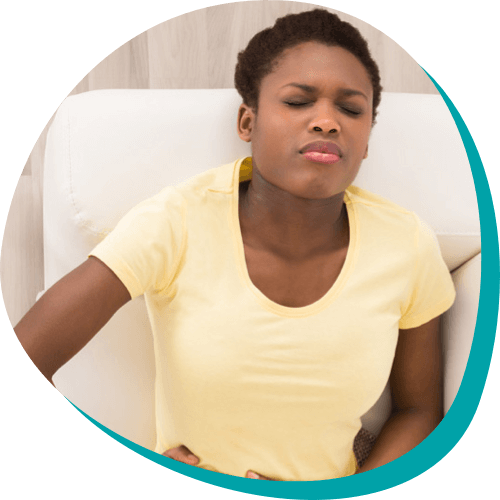For many women, the onset of a menstrual period comes with a number of uncomfortable symptoms that might include cramping, mood swings, fatigue and irritability. These symptoms may also include gas and bloating.
Why do some women experience period bloating and gas? Read on to learn about the connection between your monthly cycle, gas and bloating.
Why Does Period Bloating Happen?
The menstrual cycle occurs monthly and is the process of a woman’s body continually readying itself for pregnancy. In the weeks prior to menstruation, often called a period, the uterus creates a lining to prepare to nourish a potentially fertilized egg.1 Should this not occur, hormone levels change, and blood and the lining leave the woman’s body over the course of a few days.1
This fluctuation in hormones prior to the onset of menstruation may be largely responsible for why some women experience period bloating.
According to Michelle Smith at the Sutter Gould Medical Foundation, bloating is often part of a woman’s normal menstruation cycle and can be an indicator that a period is on the way.2
Progesterone, Estrogen and Bloating
Progesterone and estrogen are two hormones that fluctuate during a menstrual cycle that have significant impact on a woman’s fluid retention.
Elevated estrogen levels just before a period can cause women to retain more water than usual.4 A drop in the hormone progesterone, which helps to rid the body of excess salt and fluid, means that that water retention may lead to bloating in the days leading up to a period.4 Cells retain more water than they normally do, which can lead to a distended, uncomfortable feeling in the belly, as well as the fingers and feet.2
At other points in the cycle, a build-up of progesterone, which is also responsible for the growth and thickening of the uterine wall, can lead to dry stools and constipation.3
Fluid retention and constipation can both lead to painful, prolonged period bloating.5
Period Bloating Remedies
One key to managing this cyclic bloat has to do with your diet. In the days leading up to the beginning of your period, try limiting salty foods, which may make water retention worse.6 During your period, the drop in progesterone may make your body less efficient at ridding itself of salt, so cutting back on salty foods may help to keep period bloat at bay.6
Look for low FODMAP foods
Another diet-based preventative measure is to begin a low FODMAP diet that avoids foods that may produce gas.5
Some foods that may contribute to an uncomfortably bloated feeling include:5
- Dairy products like milk, yogurt and ice cream.
- Some sugars, like those found in apricots, plums and cauliflower.
- Other sugars found in apples and pears.
- Wheat, onions, garlic, legumes and beans.
Try magnesium
Another period bloating remedy is to take magnesium, which may help to reduce water retention.6 Talk to your doctor before beginning any new supplement, to make sure it’s the right choice for you.
Skip alcohol and fizzy drinks
Other preventative measures that you might take include avoiding alcohol and carbonated beverages.
Exercise
If bloating during your period is already an issue for you, you can usually find relief through exercise and moving around. There are even yoga positions that can help you ease the discomfort associated with gas and bloating.
While bloating during your period is a common occurrence, it’s equally normal to experience bloating at other times of the month.
One way to treat bloating and relieve gas fast is with Gas-X, which works by attacking gas bubbles in your digestive tract, and breaking them apart.
Source Citations:
- Menstrual Cycle. Office on Women’s Health. https://www.womenshealth.gov/menstrual-cycle/your-menstrual-cycle.
- How to reduce gas and a bloated belly. Sutter Health. https://www.sutterhealth.org/health/digestive/how-to-reduce-gas-and-a-bloated-belly.
- Why You Get Diarrhea, Constipation (or Both) During Your Period. Cleveland Clinic. https://health.clevelandclinic.org/why-you-get-diarrhea-constipation-or-both-during-your-period/.
- National Institutes of Health. Sex Hormone Effects on Body Fluid Regulation. https://www.ncbi.nlm.nih.gov/pmc/articles/PMC2849969/.
- Johns Hopkins Medicine. Bloating: Causes and Prevention Tips. https://www.hopkinsmedicine.org/health/wellness-and-prevention/bloating-causes-and-prevention-tips.
- Mayo Clinic. Water retention: Relieve this premenstrual symptom. https://www.mayoclinic.org/healthy-lifestyle/womens-health/in-depth/water-retention/art-20044983.





